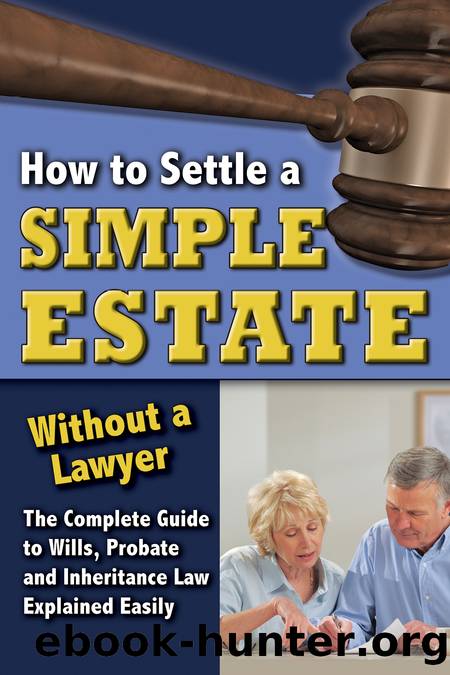How to Settle a Simple Estate without a Lawyer by Linda C. Ashar & attorney at law

Author:Linda C. Ashar & attorney at law
Language: eng
Format: epub
Tags: estate, executor, settle, simple, without a lawyer, attorney, trusts, living trusts, probate, process
Publisher: Atlantic Publishing Group Inc.
Published: 2012-12-26T00:00:00+00:00
Taking Inventory
As you saw with the sample procedure in Chapter 3, one of the first of the primary duties of the personal representative is to marshal the estateâs assets. What are they? Where are they? The following sections talk about the types of assets you are likely to encounter in the estate.
First, you should know the difference between probate property and non-probate property. When settling an estate, probate property refers to property that will go through the estate before passing on to the beneficiaries. Non-probate property is automatically passed on to the beneficiaries without needing to be part of the estate or having any effect on the value of the estate. For example, real property owned solely by the decedent, bank accounts owned solely by the decedent, and tangible property belonging to the decedent all would be considered probate property; it is up to you as the executor to find this property, inventory it, and pass it along to the appropriate beneficiaries. However, real property owned equally by two or more people, life insurance payouts, and other trusts and accounts might legally pass immediately to their proper beneficiaries with no action on the part of an estate. You will see an example of this in the joint ownership with right of survivorship deed in the first section.
Real property
Real property is exactly what it sounds like: property such as land or a house on land that is owned by the decedent. However, whether such property is part of the estate can be questionable when more than one person claims ownership of the property.
Real property is most commonly transferred outside of probate by a specific deed mechanism called a joint ownership with right of survivorship deed. This arrangement allows people to own property together and have it pass automatically to the surviving owner(s) when one of the owners named on the deed dies. This is a concept similar to joint ownership of bank accounts where more than one person is named as a joint owner on the bank account with right of survivorship; the balance of the account passes immediately and automatically to the surviving owner when the other person on the account dies. In both cases, the transfer of ownership occurs outside of probate.
Most states permit joint ownership of real property with right of survivorship. In this situation, the real property will not be part of the probate estate because the probate process is not needed to oversee the transfer. The law has provided another way to do it.
If the decedent was an owner of real estate without a survivorship arrangement, though, then the property will be part of the probate estate. The estateâs personal representative will have the responsibility of managing the property until it is either sold or transferred to a beneficiary of the estate. In the case of rental properties, for example, the personal representative will be responsible for rent collection and property maintenance. The estate representative uses the assets of the estate to cover the costs of such maintenance.
Download
This site does not store any files on its server. We only index and link to content provided by other sites. Please contact the content providers to delete copyright contents if any and email us, we'll remove relevant links or contents immediately.
| Law Office Education | Law Office Marketing & Advertising |
| Law Office Technology | Legal Services |
| Paralegals & Paralegalism | Reference |
| Research |
Philosophy of law a very short introduction by Raymond Wacks(1666)
Every Landlord's Legal Guide by Janet Portman & Stewart Marcia & Ralph Warner(1663)
How Innovation Works by Matt Ridley(1641)
Writing to Win: The Legal Writer by Steven D. Stark(1588)
Drafting Contracts: How and Why Lawyers Do What They Do, Second Edition by Stark Tina L(1496)
Law Man by Shon Hopwood(1438)
Nolo's Essential Guide to Divorce by Emily Doskow(1420)
So You Want to be a Lawyer by Lisa Fairchild Jones Esq(1404)
Profit From Your Idea: How to Make Smart Licensing Deals by Attorney Richard Stim(1339)
Nolo's Encyclopedia of Everyday Law: Answers to Your Most Frequently Asked Legal Questions by Shae Irving & Nolo (Editor)(1323)
Introduction to the study and practice of law in a nutshell by Kenney F. Hegland(1321)
Garner's Modern English Usage by Bryan Garner(1244)
Nolo's Encyclopedia of Everyday Law: Answers to Your Most Frequently Asked Legal Questions by Shae Irving; Nolo (Editor)(1235)
Best Practice by J.A. Armstrong(1195)
Insight Guides Japan (Travel Guide eBook) by Insight Guides(1182)
Data Protection: A Practical Guide to UK and EU Law by Carey Peter(1139)
International Trade and Business: Law, Policy and Ethics by Gabriël Moens & Peter Gillies(1137)
Everybody's Guide to Small Claims Court by Attorney Ralph Warner (Nolo)(1040)
Credit Repair by Loftsgordon Amy(1037)
